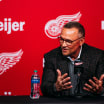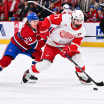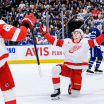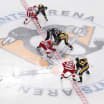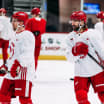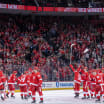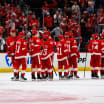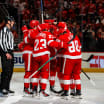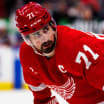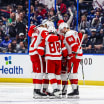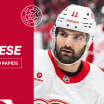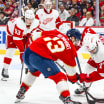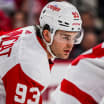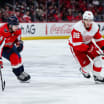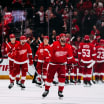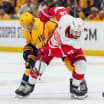DETROIT-Scotty Bowman had decided that coaching the Detroit Red Wings was going to be a two-year gig.
After the two years were up, he would make his next move, whether it was within the Wings organization or somewhere else. His coaching days were numbered.
Reflections of a coaching legend
Scotty Bowman dishes on the Joe, the Cups, the Russian Five and trading Steve Yzerman
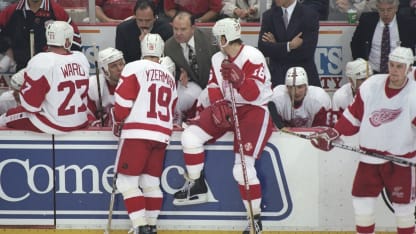
© Robert Laberge/Allsport
By
Arthur J. Regner @ArthurJRegner / DetroitRedWings.com
"I got a call from Jimmy Devellano that the Red Wings were making a coaching change and would I consider the job. He knew I wasn't going to coach, I had not planned on coaching very long," Bowman said. "I went for an interview, I was very impressed with both Marian and Mike Ilitch and I was in a contract dispute with Pittsburgh that I didn't really enjoy.
"So I was ready for a change and I was actually going to go to Detroit for just a two-year contract and then just possibly stay with the team, but not in a coaching capacity.
"Then the next thing you know, after the two years we were getting better but we weren't there yet. I decided to keep going. I only went year by year, I never signed more than one year at a time, the first contract was two years, and then I stayed seven more."
During his first year in Detroit, it didn't take Bowman long to realize the Red Wings were a rising team with many talented players. He also knew that the Ilitches were committed to doing whatever was needed to bring the Stanley Cup to Detroit.
While Detroit had drafted well and was willing to spend mega dollars to acquire talent, there were several factors that led to the Wings becoming the preeminent franchise in the NHL, according to Bowman.
"We started to get goaltending. We made a trade, it was not an easy trade at the time, but we traded for Mike Vernon. We traded one of our better defensemen, Steve Chiasson," Bowman said. "But it was a good trade for us. We got an established goalie who had won a Cup with Calgary. It was an important acquisition and he helped develop Chris Osgood and then after that, we had the luxury of getting Dominik Hasek. I think the goaltending kind of put us over the top."
As Detroit's goaltending was coming into form, the Wings made several high-profile moves such as acquiring Brendan Shanahan, Chris Chelios, Brett Hull, and Luc Robitaille, but it was what were viewed as several secondary moves that really solidified the Red Wings championship pedigree.
Igor Larionov was a constant thorn in the Wings side during the 1994 playoffs as a member of the San Jose Sharks. Detroit was upset by San Jose that year in the quarterfinals and Bowman believed Larionov was a key reason why.
When Detroit traded high-scoring winger Ray Sheppard for Larionov in October of 1995, Bowman was not dreaming of the Russian Five, though Larionov was the last of the Russian Five to join the Wings. The Wings acquired Slava Fetisov in April of 1995.
"What precipitated the trade was we had an abundance of right wingers. We had Ray Sheppard, we had Dino Ciccarelli, we had a good, young right winger coming from our farm team in Martin Lapointe," said Bowman. "We knew how good Larionov had been in the playoffs, he just about singlehandedly knocked us out.
"We cherish the fact that Igor was a world-class player even though he was in his late 30's. Getting Igor was really the icing on the cake because it gave us another centerman along with Kris Draper, Sergei Fedorov and Steve Yzerman; that was a big trade for us."
With the addition of Larionov, the Wings had five Russian players who were a cut above - Larionov, Fetisov, Fedorov, Vladimir Konstantinov and Slava Kozlov. These five Russians would eventually become the Russian Five and change the game of hockey.
"I think people knew the Russian players were good, but when the five of them got together and played as a unit it showed a different brand of hockey." Bowman revealed. "What it did for us is that it gave a puck-possession ingredient to our team. We were solid defensively, but if you think about our team in those years and even later on after I left, the defense of the Red Wings was the fact that when they had the puck, they didn't give it away. They kept the puck."
As the Russian Five were revolutionizing the game, Detroit made moves to land Kirk Maltby in March of 1996 and Larry Murphy in March of 1997 and the Stanley Cups soon followed.
"Toronto had a really excellent general manager who had built the team, Cliff Fletcher, he came from Calgary and he really turned them around and unfortunately for Cliff, the ownership of the Leafs changed, a new owner came in, Steve Stavro, and he wanted to cut expenses," Bowman said. "We were so fortunate. I got a call at about five to 1 and I think the trade deadline was 1 o'clock and Cliff Fletcher said, 'Look, we're cutting payroll if you want a player and you want to take his contract he's got this year and next year, we'll let you have Larry Murphy for nothing.' We all looked at each other and I said, 'Look, this is a no-brainer.' So I called the ownership and explained everything and I had to call Cliff back.
"I didn't have much time and I said, 'Cliff, we're OK for the first year, we think he can come in and help us, let's not worry about next year.' We didn't think Larry would play more than one year, so we agreed to split the buyout, you could buy out players' contracts, we agreed to split the buyout for the next season.
"Larry played four more seasons, but that's where Nick Lidstrom came into play. Nick developed a lot of good players that became real first liners that maybe would have been on the second or third defense corps. We got really lucky. Sometimes you make moves and they look so good after.
"Murphy came in and I'm not saying that he went onto Nick's shoulders; he was a perfect fit with Nick."
Lidstrom and Murphy worked so well together that they shut down Philadelphia's vaunted 'Legion of Doom' line in the 1997 Stanley Cup finals, which saw the Wings reclaim the Cup for the first time in 42 years.
"You know, we look at all the All-Stars and all the Hall of Fame players that played on those teams but I think the edge that we always had in that playoff era of winning Cups was having Draper, Maltby, (Darren) McCarty and (Joey) Kocur," Bowman said. "McCarty and Kocur were both interchangeable but they (the entire Grind Line) were regarded like third-line, fourth-line players but no team could handle their work ethic. They were solid defensively, they gave us a good edge.
"Intimidation was a big part of the '90s. It's not part of the hockey now. We never could get intimidated because we had those guys (Bowman included Shanahan and Lapointe) ready at the drop of a hat if anybody wanted to take anybody on, we had the guys that could play hockey and also could get in a scrap."
Bowman summarizes his Red Wings coaching career this way:
"All those little pieces, I feel we were so lucky with so many things falling into place some of them were by design and some of them were just good fortune. That's what I remember about Detroit."
Bowman is well aware that his superstar players always produced in crunch time. Yzerman, Lidstrom and Fedorov were homegrown talents that were the backbone to his Detroit Stanley Cup teams, but if there was an uneasy period for him as Wings coach, it was when many believed he wanted to trade Steve Yzerman to Ottawa.
"This thing was really blown out of proportion. What happened on that was we had acquired a new president (Bill Evo) of the team. He was only there a short time and he had gone to a governors meeting." Bowman said. "Bill Evo came back from the meeting and he wasn't demanding or anything, he just said, 'This fellow from Ottawa, Randy Sexton, whispered in my ear that if you ever wanted to make a trade.' I'm not sure; they had just drafted (Alexei) Yashin, he was supposed to be a big Russian star.
"Here's how far it went, Bill said, 'I know we're not ready to do anything, but keep it in the back of your mind,' and I said, "We can keep it in the back of both of our minds, Bill, but I want to tell you something, it doesn't matter what happens to you or I. Mr. Ilitch will never, ever trade Steve Yzerman.
"So, it's just a moot point even if they offered us the franchise. It's not ever going to happen as long as Mr. Ilitch owns this team."
NHL teams are always talking to one another about possible deals. Whether there was ever a trade being discussed between the Senators and the Red Wings, Bowman is adamant that Yzerman was never part of any serious trade talks.
"Again, that thing was completely overblown," Bowman said. "There was never a chance that ownership would have ever even thought of, whether it was going to happen or not, Steve Yzerman would never have been anything but a Red Wing.
"That was a dream for somebody in Ottawa, I guess."
There was a conversation that did take place between Yzerman and Bowman that changed the direction of the Wings and Yzerman's career.
"When I went to Detroit, I mentioned it to Steve that the only way - we're talking about a player that scored 65 goals and had a 160 points and the team still couldn't get through the playoff rounds - I said, 'Steve the only problem is we're going to have to play better defensively and you can lead the charge and at the same time it's really going to affect your individual statistics and he said, 'I don't care about individual statistics.'
"Steve Yzerman in his heyday, which I considered from that point on with all the three or four Cups, he's the one that put defense and offense together."
Bowman will be in attendance at the Joe's last game. His most vivid memories of Joe Louis Arena are not about what occurred on the ice.
"The closeness of all the people that worked in the building, they felt they were part of the Red Wings, they just weren't people that worked in the arena," Bowman said. "The electricians, the maintenance people, the chef, Al Sobotka, these kind of guys, they were so much a part of the team, they agonized over the defeats, they enjoyed the victories.
"It was compact, the building had a certain air about it. It wasn't a fluffy edifice that nobody knew how to get around. It was a simple place but it had so much history, but the attitude of the people was always A-1, we don't score goals, we don't stop pucks, but again, they felt part of the team and I think that came right down from the top."



